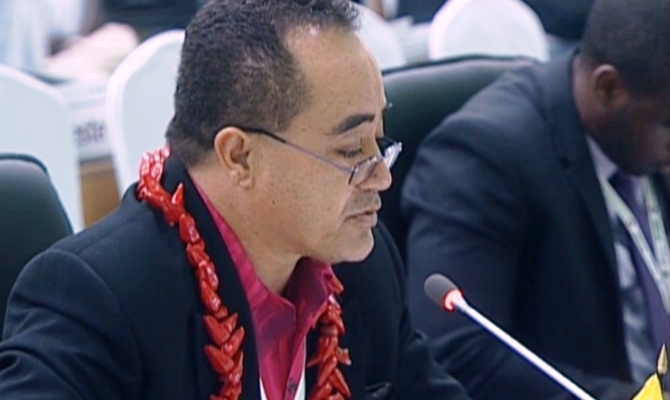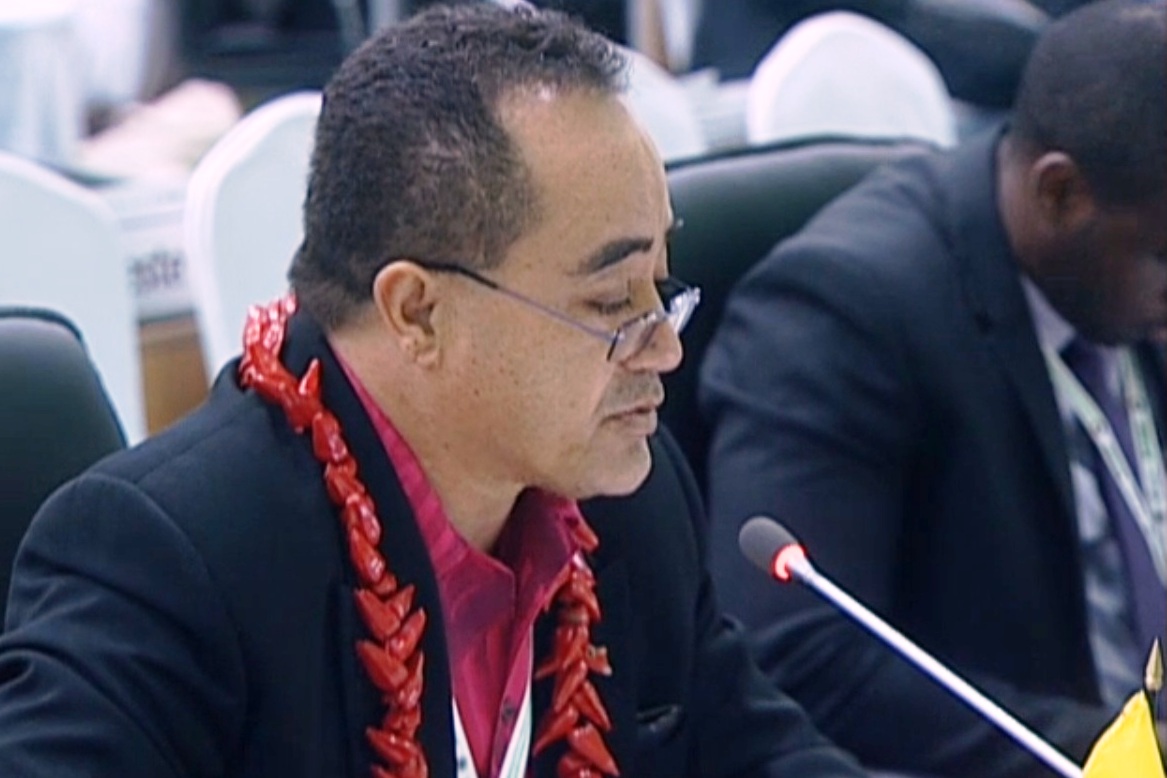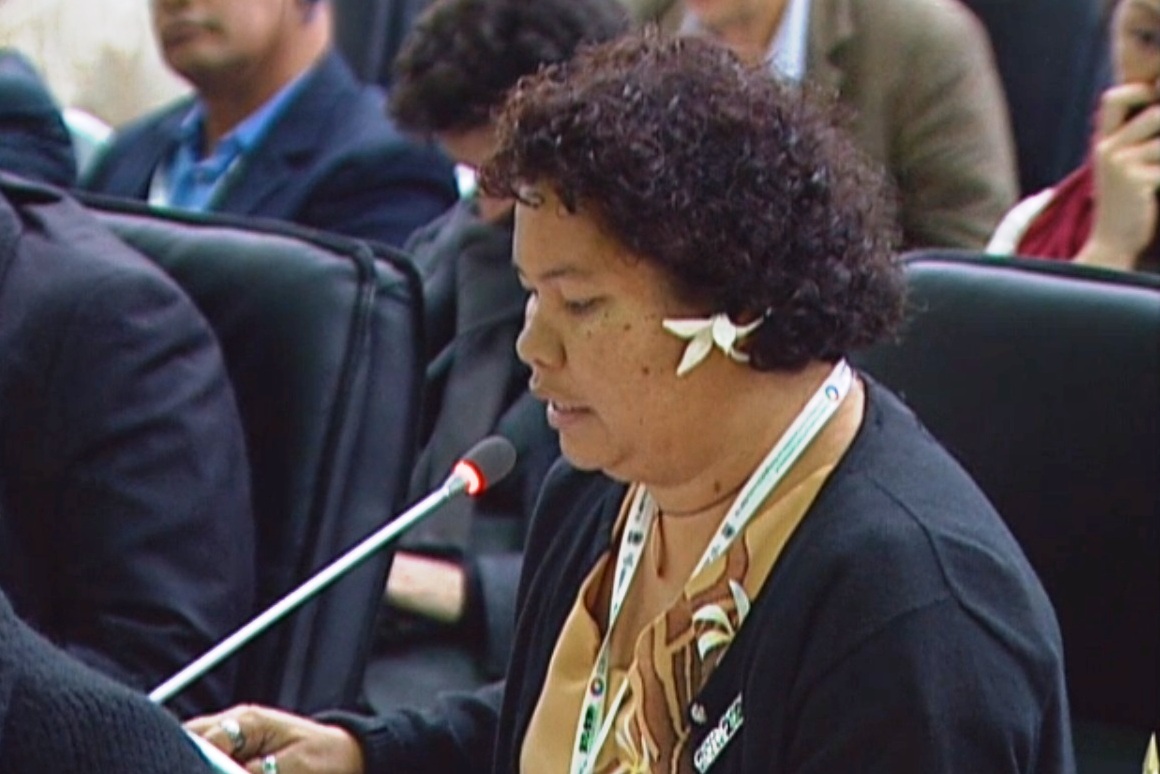
Island and Ocean Ecosystems
13 October 2014, Pyeongchang, Korea, CBD COP12 - Samoa, as host of the Third International Conference on Small Islands Developing States, was the first Pacific island to make a statement at the first meeting of the Parties to the Nagoya Protocol.
Fiji, FSM, Samoa and Vanuatu have ratified this Protocol on Access to Genetic Resources and the Fair and Equitable Sharing of Benefits Arising from their Utilisation. The Protocol entered into force on 12 October with 54 parties, it aims to share the benefits arising from the utilisation of genetic resources in a fair and equitable way.
This includes by appropriate access to genetic resources and by appropriate transfer of relevant technologies, taking into account all rights over those resources and to technologies, and by appropriate funding, thereby contributing to the CBD and the sustainable use of its components.
In the 1990's Samoa had come across the issue of bioprospecting, the process of discovery and commercialisation of new products based on biological resources, over the mamala plant where which was used by traditional healers to treat a number of ailments.
Samples of the mamala were sent to the US where it was discovered to contain prostatin, a compound with was found to have activity against the HIV-AIDS virus. Work began to develop the compound for medicinal purposes.

"Disputes arose over whether prior informed consent had been validly granted. There were issues over patenting of the genetic resource. Disputes arose over benefit sharing arrangements. There was debate over the divulgence of traditional knowledge. At that time there were no specific research permit requirements in Samoa and there was little guidance to Government on what to do," presented Suluimalo Amataga Penaia, CEO of the Ministry of Natural Resources and Environment during his statement
"Many years have passed and the world now has a way of dealing with this type of scenario through the Nagoya Protocol, to which Samoa recently became a Party."
"Samoa's capacity has been developed and improved through trainings, workshops, meetings, with support from the CBD Secretariat and importantly through our valued partnerships with the Secretariat of the Pacific Regional Environment Programme (SPREP), the Access and Benefit Sharing Capacity Building Initiative and the Government of Australia. Samoa is currently participating in a new GEF regional project to support ratification and implementation of the Nagoya Protocol."
Samoa has developed a new Environment Management and Conservation Bill which includes provisions on Access and Benefit Sharing which will help manage and maintain the utilisation of the genetic resources in Samoa to ensure sustainable management and conservation of biodiversity.
Also to make a statement during the first day of the Nagoya Protocol Parties Conference was the Federated States of Micronesia, standing in solidarity with Fiji, Samoa and Vanuatu.

Since ratifying the Nagoya Protocol FSM has made progress in its Access and Benefit Sharing development efforts with technical assistance and support in the areas of a gap analysis that identified knowledge, capacity and institutional gaps, the drafting of a policy through stakeholder consultation articulating a vision, goals, scope, definition and administrative procedures.
Yet there are still implementation challenges that FSM faces such as situating the Nagoya Protocol within their legal and political system as well as the complexity of their terrestrial and marine tenure and ownership regimes.
"While we are trying to progress our Access and Benefit Sharing Efforts we are working to address issues and challenges such as comprehension of the advanced Access and Benefit Sharing related technology and industry and, the effective coordination between the science and technical agencies and the legal counterparts to administer an ABS Framework."
Micronesia noted the close link between ABS and Traditional Knowledge (Article 8j) and stressed the need to ensure closer collaborations and integration between the two.
Ms. Takesy ended her statement recognising the significant role of women as in Micronesia women are the terrestrial and marine near shore custodians at the local level.
The statements presented by the Pacific islands on day one of this historic event were well received. The First Meeting of the Nagoya Protocol is from 13 - 17 October in Pyeongchang, Korea.
Fiji, FSM, Samoa and Vanuatu have ratified this Protocol on Access to Genetic Resources and the Fair and Equitable Sharing of Benefits Arising from their Utilisation. The Protocol entered into force on 12 October with 54 parties, it aims to share the benefits arising from the utilisation of genetic resources in a fair and equitable way.
This includes by appropriate access to genetic resources and by appropriate transfer of relevant technologies, taking into account all rights over those resources and to technologies, and by appropriate funding, thereby contributing to the CBD and the sustainable use of its components.
In the 1990's Samoa had come across the issue of bioprospecting, the process of discovery and commercialisation of new products based on biological resources, over the mamala plant where which was used by traditional healers to treat a number of ailments.
Samples of the mamala were sent to the US where it was discovered to contain prostatin, a compound with was found to have activity against the HIV-AIDS virus. Work began to develop the compound for medicinal purposes.

Suluimalo Amataga Penaia, CEO of the Ministry of Natural Resources and Environment of Samoa
"Disputes arose over whether prior informed consent had been validly granted. There were issues over patenting of the genetic resource. Disputes arose over benefit sharing arrangements. There was debate over the divulgence of traditional knowledge. At that time there were no specific research permit requirements in Samoa and there was little guidance to Government on what to do," presented Suluimalo Amataga Penaia, CEO of the Ministry of Natural Resources and Environment during his statement
"Many years have passed and the world now has a way of dealing with this type of scenario through the Nagoya Protocol, to which Samoa recently became a Party."
"Samoa's capacity has been developed and improved through trainings, workshops, meetings, with support from the CBD Secretariat and importantly through our valued partnerships with the Secretariat of the Pacific Regional Environment Programme (SPREP), the Access and Benefit Sharing Capacity Building Initiative and the Government of Australia. Samoa is currently participating in a new GEF regional project to support ratification and implementation of the Nagoya Protocol."
Samoa has developed a new Environment Management and Conservation Bill which includes provisions on Access and Benefit Sharing which will help manage and maintain the utilisation of the genetic resources in Samoa to ensure sustainable management and conservation of biodiversity.
Also to make a statement during the first day of the Nagoya Protocol Parties Conference was the Federated States of Micronesia, standing in solidarity with Fiji, Samoa and Vanuatu.

Ms. Alissa Takesy, head of the FSM Delegation
Ms. Alissa Takesy, head of the FSM Delegation called upon SIDS to accede to the Protocol as noted in the SAMOA Pathway (Small Island Developing States Accelerated Modalities of Action) Document an outcome of the UNSIDS Conference.Since ratifying the Nagoya Protocol FSM has made progress in its Access and Benefit Sharing development efforts with technical assistance and support in the areas of a gap analysis that identified knowledge, capacity and institutional gaps, the drafting of a policy through stakeholder consultation articulating a vision, goals, scope, definition and administrative procedures.
Yet there are still implementation challenges that FSM faces such as situating the Nagoya Protocol within their legal and political system as well as the complexity of their terrestrial and marine tenure and ownership regimes.
"While we are trying to progress our Access and Benefit Sharing Efforts we are working to address issues and challenges such as comprehension of the advanced Access and Benefit Sharing related technology and industry and, the effective coordination between the science and technical agencies and the legal counterparts to administer an ABS Framework."
Micronesia noted the close link between ABS and Traditional Knowledge (Article 8j) and stressed the need to ensure closer collaborations and integration between the two.
Ms. Takesy ended her statement recognising the significant role of women as in Micronesia women are the terrestrial and marine near shore custodians at the local level.
The statements presented by the Pacific islands on day one of this historic event were well received. The First Meeting of the Nagoya Protocol is from 13 - 17 October in Pyeongchang, Korea.